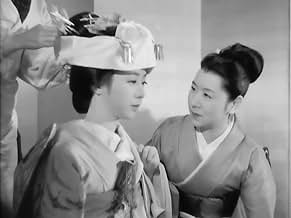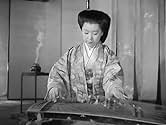IMDb-BEWERTUNG
7,4/10
2028
IHRE BEWERTUNG
Shinnosuke wird Shizu als zukünftige Frau vorgestellt, aber er verliebt sich in ihre verwitwete Schwester Oyu. Oyu überzeugt Shinnosuke und Shizu zu heiraten, damit sie in der Nähe von Shinn... Alles lesenShinnosuke wird Shizu als zukünftige Frau vorgestellt, aber er verliebt sich in ihre verwitwete Schwester Oyu. Oyu überzeugt Shinnosuke und Shizu zu heiraten, damit sie in der Nähe von Shinnosuke bleiben kann.Shinnosuke wird Shizu als zukünftige Frau vorgestellt, aber er verliebt sich in ihre verwitwete Schwester Oyu. Oyu überzeugt Shinnosuke und Shizu zu heiraten, damit sie in der Nähe von Shinnosuke bleiben kann.
- Regie
- Drehbuch
- Hauptbesetzung
Empfohlene Bewertungen
Yûji Hori has hired a match maker, but he has rejected all of her proposed ladies. Finally she brings to him Nobuko Otowa. He is iffy about her, and the match maker's patience is running short. Does he even know what he is looking for in a wife? He knows. It is the woman who accompanied Miss Otowa, her widowed sister Kinuyo Tanaka. However, her son is the clan heir, and therefore she may not remarry. She urges him to marry her sister, so she can visit her.
Kenji Mizoguchi's movie is not one of his great movies, but it is an impeccably executed bit of soap opera. All three principals are aware of each other's feelings, and nothing is said. When Miss Tanaka's son dies, she is thrust from her home, her brother will not take her in, nor can she move in with her sister -- the gossip would only increase.
As I said, it's not one of Mizoguchi's major works, but that doesn't mean he did a shoddy job; he seemed incapable of that. The last two shots, with their subjective cameras, are heartbreaking.
Kenji Mizoguchi's movie is not one of his great movies, but it is an impeccably executed bit of soap opera. All three principals are aware of each other's feelings, and nothing is said. When Miss Tanaka's son dies, she is thrust from her home, her brother will not take her in, nor can she move in with her sister -- the gossip would only increase.
As I said, it's not one of Mizoguchi's major works, but that doesn't mean he did a shoddy job; he seemed incapable of that. The last two shots, with their subjective cameras, are heartbreaking.
"Miss Oyu" is about a man in love with the elder sister of his wife. In fact he was already in love when he married, and he married only to become the brother in law of his loved one.
In Western style movies this love triangle would be all about trickery and deceit. In this Japanese film it is all about self sacrifice. The wife knows very well that her husband doesn't love her but wants to allow her sister a sexual relationship. A relationship that tradition denies to a widow with children.
The only Western film that vaguely resembles "Miss Oyu" in the treatment of a love triangle is part 9 of the "Dekalog" (1989, Krzysztof Kieslowski) in which an impotent man encourages his wife to take a lover. In this film self sacrifice ex ante does not preclude jealousy ex post. Also in "Miss Oyu" self sacrifice has its price.
"Miss Oyu" is based on a story by Junichiro Tanizaki and directed by Kenji Mizoguchi. Given these two big names one would expect a film of high quality. "Miss Oyu" is however at times very sentimental.
The reason probably is that "Miss Oyu" is the first film Mizoguchi made for the Daiei studio and the Daiei studio needed a commercial success very badly. By the term "studio system" everybody thinks of Hollywood, but the studio system in Japan worked more or less the same. When you were a renowned director, as Mizoguchi was, you were allowed to make one film for the sudio and one film according to your own artistic interest. "Miss Oyu" was for the studio.
In Western style movies this love triangle would be all about trickery and deceit. In this Japanese film it is all about self sacrifice. The wife knows very well that her husband doesn't love her but wants to allow her sister a sexual relationship. A relationship that tradition denies to a widow with children.
The only Western film that vaguely resembles "Miss Oyu" in the treatment of a love triangle is part 9 of the "Dekalog" (1989, Krzysztof Kieslowski) in which an impotent man encourages his wife to take a lover. In this film self sacrifice ex ante does not preclude jealousy ex post. Also in "Miss Oyu" self sacrifice has its price.
"Miss Oyu" is based on a story by Junichiro Tanizaki and directed by Kenji Mizoguchi. Given these two big names one would expect a film of high quality. "Miss Oyu" is however at times very sentimental.
The reason probably is that "Miss Oyu" is the first film Mizoguchi made for the Daiei studio and the Daiei studio needed a commercial success very badly. By the term "studio system" everybody thinks of Hollywood, but the studio system in Japan worked more or less the same. When you were a renowned director, as Mizoguchi was, you were allowed to make one film for the sudio and one film according to your own artistic interest. "Miss Oyu" was for the studio.
Heart-wrenching and sad tale of love and sacrifice under harsh traditional rules is told in beautiful, lyrical black-and-white imagery and the cast perform excellently throughout, especially Kinuyo Tanaka in the title role.
Kenji Mizoguchi's movie 'Miss Oyu' is simply masterful. It is based on a short story (The reed cutter) by Junichiro Tanizaki. But, while the motives and the emotions of the protagonists in the short story are sometimes rather ambiguous, they are totally purified in the screenplay. The protagonists exemplify traditional family roles and are confronted with these traditions, like in this movie a widow with children. She cannot remarry, because she must stay in her husband's family home to raise her children.
The main topic of the movie is forbidden love, and more generally the impossibility of being happy in this world, which are very characteristic themes in Kenji Mizoguchi's films. The film illustrates also some typical aspects of J. Tanizaki's work, like the 'physical' (facial) influence of a mother on the future emotional life of her son, or the fear of scandal and of losing one's face in society.
This film shines through the purity and the intensity of the emotions of the protagonists (hidden for a long time, they erupt violently), through the marvelous performances of the actors and through its forceful message about the all importance of love. A must see.
The main topic of the movie is forbidden love, and more generally the impossibility of being happy in this world, which are very characteristic themes in Kenji Mizoguchi's films. The film illustrates also some typical aspects of J. Tanizaki's work, like the 'physical' (facial) influence of a mother on the future emotional life of her son, or the fear of scandal and of losing one's face in society.
This film shines through the purity and the intensity of the emotions of the protagonists (hidden for a long time, they erupt violently), through the marvelous performances of the actors and through its forceful message about the all importance of love. A must see.
A man falls in love with the sister of his bride-to-be, but all parties involved are bound by societal constraints. The film has the usual stunning cinematography, with graceful tracking moves and elegant framing. The story is engaging, easy to follow and doesn't drag. It's an all-around good movie. But as I've said before, lately I'm getting bored with Mizoguchi. His films just don't thrill me like they used to. It gets kind of tiresome to watch people hang their heads and bemoan their situations all the time. I get that the point is they're being repressed by archaic social expectations, but it'd be nice to see a little more resistance. Everyone is so damn passive. Again, it's a well-crafted film but one that doesn't really inspire a lot of sympathy for the characters.
Wusstest du schon
- VerbindungenReferenced in Aru eiga-kantoku no shôgai (1975)
Top-Auswahl
Melde dich zum Bewerten an und greife auf die Watchlist für personalisierte Empfehlungen zu.
Details
Box Office
- Weltweiter Bruttoertrag
- 5.020 $
- Laufzeit
- 1 Std. 34 Min.(94 min)
- Farbe
- Sound-Mix
- Seitenverhältnis
- 1.37 : 1
Zu dieser Seite beitragen
Bearbeitung vorschlagen oder fehlenden Inhalt hinzufügen

























